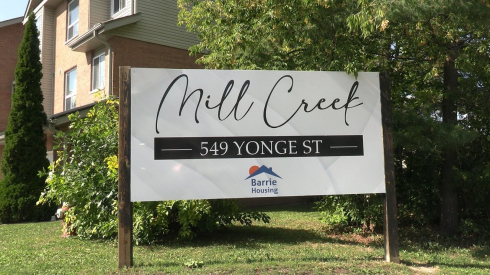- Start playing the video
- Click CC at bottom right
- Click the gear icon to its right
- Click Subtitles/CC
- Click Auto-translate
- Select language you want
Grief Into Action: Simcoe County Marks International Overdose Awareness Day
August 31 is recognized globally as International Overdose Awareness Day, a time to remember those lost to drug poisoning and to rally for change. In Simcoe County, several events were held to mark the occasion, bringing together families, advocates, health workers, and community members who share a common goal: ending the stigma, saving lives, and addressing the toxic drug crisis. The North Simcoe Drug Strategy hosted a community gathering outside the Midland Public Library, while Moms Stop the Harm and Ryan’s Hope organized a moving vigil in Barrie. Both events combined mourning with advocacy, creating space for grief, compassion, and calls for urgent action.
At the Midland event, Angela Vos of Jordan’s Life spoke with Deepak Bidwai, LJI journalist, about the reality behind the word “overdose.” She argued that the term itself is misleading, explaining that people are not simply taking too much of a substance by accident—they are being poisoned by a toxic and unpredictable drug supply. Vos highlighted that many who use drugs do so in response to overwhelming life challenges such as mental health struggles, unstable housing, or other unmet basic needs. In her view, drug use is often an act of self-medication in the absence of proper support systems, and real solutions must target those root causes.
Vos also emphasized the importance of shifting the language society uses when discussing substance use. By reducing stigma and framing the crisis honestly, she said, communities can create safer, more supportive environments where people are not judged but instead offered dignity and help. She underscored the role of safe consumption sites, which not only prevent deaths in public spaces but also provide vital points of connection. These facilities can link individuals to resources, care, and pathways toward recovery when they are ready—meeting people where they are rather than setting impossible expectations without stability.
Christine St Amant, a Public Health Nurse with the Simcoe Muskoka District Health Unit, also spoke at the Midland gathering. She explained that the purpose of the event was twofold: to honour the lives lost and to raise awareness about the severity of the toxic drug crisis in the region. “No one ever chooses to have a substance use disorder. It is a medical issue and should be treated as such,” she stated, urging those in attendance to foster compassion, understanding, and kindness in their communities.
St Amant drew attention to the troubling rise in opioid poisonings and deaths across Simcoe Muskoka. She reminded residents that addiction is not a matter of willpower or poor choices but a complex health issue that demands a healthcare response. The Health Unit continues to work on the front lines, distributing naloxone kits, delivering education, and connecting people to outreach and support services—all in an effort to save lives and reduce harm while broader policy changes are pursued.
Meanwhile, in Barrie, a candlelight vigil outside City Hall provided a powerful reminder of the human toll behind the statistics. Christine Nayler, Co-founder of Ryan’s Hope, spoke with courage and conviction, sharing her own family’s story of loss. The group was founded five years ago in memory of her son, Ryan, who died of an overdose. In that time, Canada’s national death toll from drug poisonings has soared from 23,000 to more than 56,000. Nayler described these deaths as preventable—tragedies made worse by policies that ignore evidence and, in her words, too often “prioritize political gain over human life.”
Her message was blunt but necessary: the drug crisis does not discriminate. It tears through families, classrooms, workplaces, and entire communities. Each death sends shockwaves of grief that ripple far beyond the individual, leaving scars that affect friends, neighbours, and colleagues alike.
As the crowd held candles and shared stories, the vigil became more than a memorial. It was a collective demand for action. Those gathered refused to let stigma silence them; instead, they spoke the names of loved ones lost, carrying their memory forward as a call to change.
Nayler closed her remarks with a message of persistence and solidarity. While the crisis continues to claim lives at an alarming rate, she reminded everyone that the movement for compassion, evidence-based policy, and human dignity is only growing stronger. “The fight,” she said, “is far from over. And it’s growing.”
Add new comment
Simcoe Community Media is a non-profit media organization based in Barrie, Ontario, specializing in civic journalism. Our mission is to foster an informed, connected, and vibrant community by amplifying diverse voices and perspectives, promoting transparency, and encouraging public discourse.











We encourage comments which further the dialogue about the stories we post. Comments will be moderated and posted if they follow these guidelines:
The Community Media Portal reserves the right to reject any comments which do not adhere to these minimum standards.